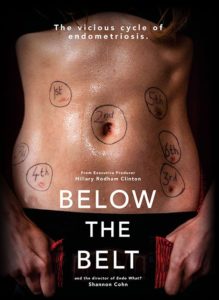A little less conversation a little more action: Can awareness lead to change in women’s health?

Awareness raising is an important element of tackling taboo topics, and it’s evident that large public campaigns have catapulted previously ‘off-limit’ issues into the spotlight; this is especially true for issues surrounding women’s health.
Just this week, a new documentary ‘Below the belt’ from filmmaker Shannon Cohn had its London screening premiere. The film is a powerful follow-up to ‘Endo What’, shining a spotlight on endometriosis, a painful condition that affects 200 million women and those assigned female at birth globally, with 1 in 10 experiencing it in the UK.
Through the lens of four patients urgently searching for answers to ‘mysterious symptoms’, the documentary is part of a global campaign, exploring the continuous taboo around female reproductive health, gender bias in the medical profession, lack of education and much more. Culminating in a follow up panel discussion, including advocates and professionals in the women’s health field, the event inspired a sense of optimism that change is possible, if only we can make people listen.
But, while being in a room full of like-minded people who all strive towards the same mission – improving women’s health, including tackling inequity within women’s health globally – certainly felt impowering, I can’t help but also feel a sense of dread, anger, and disappointment at how far we still have to go.
Having worked across the non-profit and public sector, and now in a communications agency, I’ve had a front row seat to the slow pace of progress in this area I care so deeply about. It’s frustrating that a ‘progressive country’ like the UK has the largest female health gap in the G20 and the 12th largest globally.
Perhaps it’s time for a more radical solution to tackle women’s health and the breadth of injustices in equality, especially around the lack of research funding, which is the root to developing a better understanding of conditions such as endometriosis, and develop better diagnostic tools and treatments to prevent, diagnose and treat women’s reproductive health issues.
We’ve known for a long time that the status-quo in medicine is male-focussed and that funding into women’s health is scarce. In 2019, the ‘Better for Women’ report by the RCOG called on the government to tackle the gender data gap through increased research funding into women’s health.
In the US, only around $5 billion of the total $42 billion the National Institutes of Health (NIH) spends on medical research each year goes towards women’s health. The UK isn’t any better, spending just about 2.1% of publicly funded research on reproductive health. And let’s not forget the disparities within women’s health, where sexism and gender bias meet racism, leading to a double whammy of health inequities for women from ethnic minority backgrounds.
While I’m by no means a medical expert, I understand that research by nature takes time. But, if we’ve learned anything over the past two years dealing with a global pandemic, the slow pace can pick up very quickly when funding and other resources are allocated. We cannot afford to continue with the slow pace – after all, we’re already playing catch-up with the many lost decades when women weren’t even included in clinical trials.
I don’t quite have the answer to what a radial solution should look like, but what I do know is that awareness raising will always be a crucial part of it, but by no means the only solution.
As a communications expert with more than 10 years of experience, shining a light on health issues such as infertility, body image, hearing loss, female genital mutilation (FGM) and more, I have seen the real-life impact successful awareness raising campaigns can have, beyond ‘simply’ breaking stigma.
Grassroots organisation Five X More’s campaign raising awareness of the disparities in maternal health outcomes for Black women was instrumental in bringing about the first ever APPG on Black Maternal Health, while pressure from awareness raising campaigns from Fertility Network UK have seen debates in parliament to address the postcode lottery of NHS fertility funding.
Menopause, a natural part of aging women have experienced since the beginning of humankind, is having its Cinderella moment right now, with simultaneous campaigns across different countries demanding more support from the healthcare sector- whether that’s forcing governments to address the HRT shortage, or improving access to better emotional support and prevention to tackle menopause related long term conditions such as osteoporosis.
And on the endometriosis front, charity Endometriosis UK has launched a campaign to improve endometriosis care by updating NICE guideline on endometriosis diagnosis and management.
There are many more examples and I’d argue that continuous pressure through awareness raising campaigns have mobilised voices across the UK demanding more for women’s health, with the first ever Women’s Health Strategy being on the horizon to reform the healthcare system. It’s testament to the real power of PR and awareness raising campaigns, highlighting why it’s more important than ever that as communications experts we don’t get discouraged and stay the course, even if progress is slow.
With PR having a reputation for ‘quick wins’ and ‘stunts’, the real challenge of successful awareness raising is not only to get people’s attention, but to keep them engaged over a longer period to create real change. At Ketchum, our motto is to support our clients with doing work that matters and to make progress, so each strategy we develop has this ethos at its core.
And while it’s clear that awareness raising alone won’t improve women’s health or solve health inequalities, it’s certainly one of the most successful vehicles to help evoke change, bringing us closer to the destination of better prevention, diagnostics, and treatment of women’s health issues.
As a PR and comms expert, I stand proud in the fact that awareness raising will continue to be the first step towards dismantling systems that no longer serve us, or let’s be honest- never served us in the first place.
So, here’s to more loud, creative, impactful awareness campaigns with longevity that may not deliver ‘real change’ overnight, but eventually will have played an important part in creating long-lasting, impactful change!
*While we acknowledge that not all people who have a female reproductive system and experience menstruation, menopause, pregnancy and other gynecologically and reproductive conditions identify as women, for ease of terminology ‘women’ has been used throughout this article.
By Ramona Aning, Ketchum Health

